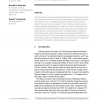Free Online Productivity Tools
i2Speak
i2Symbol
i2OCR
iTex2Img
iWeb2Print
iWeb2Shot
i2Type
iPdf2Split
iPdf2Merge
i2Bopomofo
i2Arabic
i2Style
i2Image
i2PDF
iLatex2Rtf
Sci2ools
PRESENCE
1998
1998
Human Factors Issues in Virtual Environments: A Review of the Literature
Virtual environments are envisioned as being systems that will enhance the communication between humans and computers. If virtual systems are to be effective and well received by their users, considerable human-factors research needs to be accomplished. This paper provides an overview of many of these human-factors issues, including human performance efficiency in virtual worlds (which is likely influenced by task characteristics, user characteristics, human sensory and motor physiology, multimodal interaction, and the potential need for new design metaphors); health and safety issues (of which cybersickness and deleterious physiological aftereffects may pose the most concern); and the social impact of the technology. The challenges each of these factors present to the effective design of virtual environments and systematic approaches to the resolution of each of these issues are discussed.
Considerable Human-factors Research | Deleterious Physiological Aftereffects | PRESENCE 1998 | Virtual Environments |
| Added | 23 Dec 2010 |
| Updated | 23 Dec 2010 |
| Type | Journal |
| Year | 1998 |
| Where | PRESENCE |
| Authors | Kay M. Stanney, Ronald R. Mourant, Robert S. Kennedy |
Comments (0)

